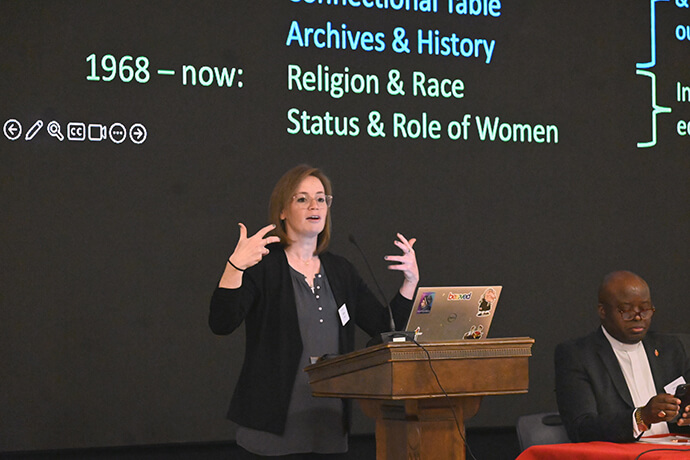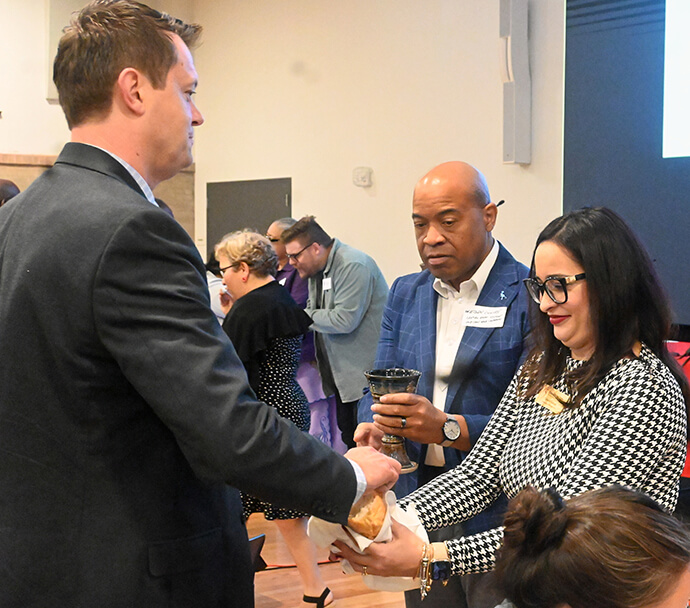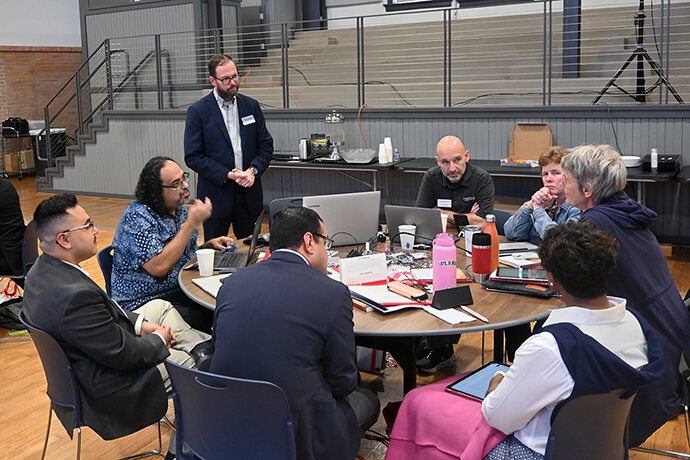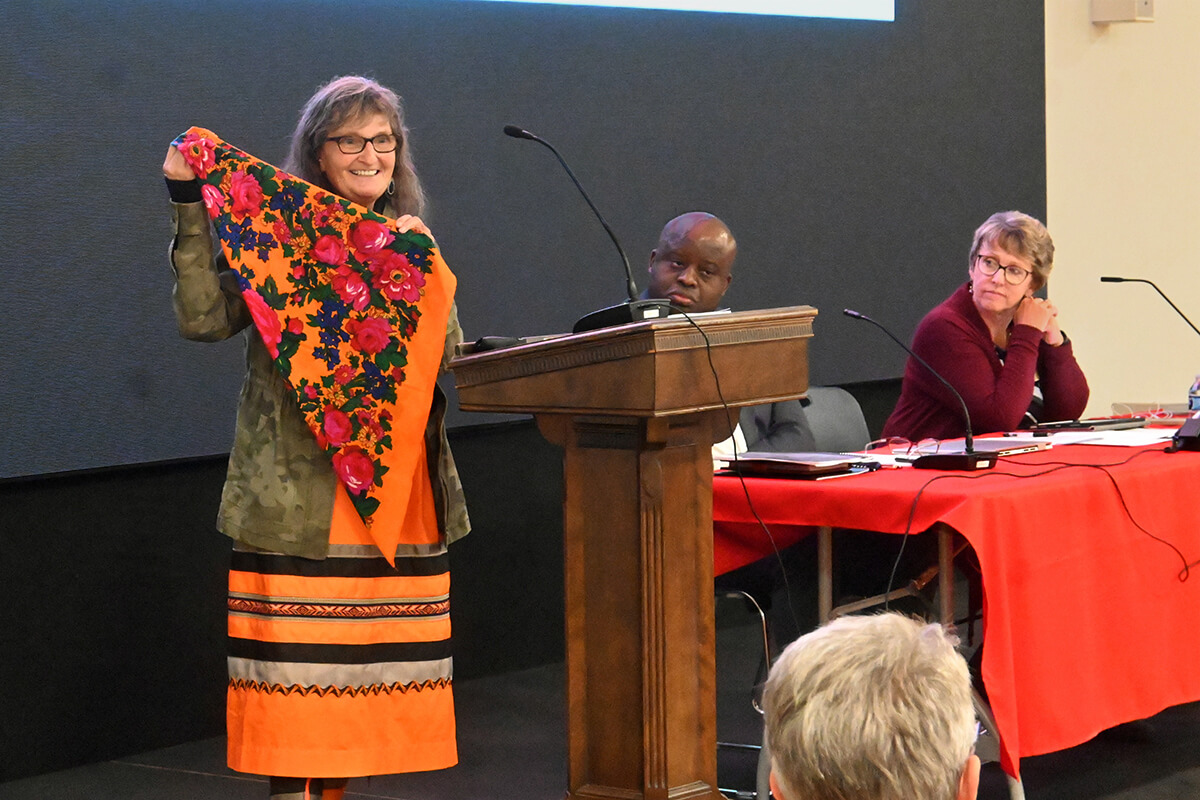Key points:
- Members of the Connectional Table, most of whom are new, met Oct. 24-27 in Dallas for an orientation meant to help them plan for “a new future.”
- The leadership body coordinates the denomination’s ministries and resources.
- A major emphasis of the orientation was learning more about colonialism, connectionalism and regionalization.
- President Biden’s apology for the government’s role in Native American boarding schools prompted Ragghi Rain Calentine, a member of the Connectional Table, to take the podium to celebrate the moment.
Before anyone could get a second cup of coffee down, Bishop Mande Muyombo emphasized to members of the Connectional Table the importance of their work.
“The Connectional Table must watch out and put the poor, the widows, the immigrants, the homeless, minorities, the sick, the disabled, the rejected, those affected by wars, violence, hurricanes, natural disasters and health pandemics … as their priorities,” he said on the first day of the Oct. 24-27 meeting at First United Methodist Church, Dallas.
“Or else Christ Jesus will have no choice than to overturn the table.”
Muyombo, who leads the North Katanga Area that encompasses both Tanzania and parts of Congo, is the chair of the Connectional Table. It is a leadership body that coordinates denomination-wide mission, resources and ministries. About 80% of the current board members are new.

To help them get orientated, David Scott, senior director of mission theology and strategic planning at the United Methodist Board of Global Ministries, spoke throughout the meeting about relevant topics including colonialism, connectionalism and regionalization. The Connectional Table helped develop the regionalization legislation approved by General Conference.
In a kismet moment on Oct. 24, word reached the conference that President Biden that day formally apologized for the government’s role in boarding schools where Native American children for decades were taught to discard their culture so they could assimilate better into the mainstream. Some of those schools were run by Methodists.
The announcement inspired Ragghi Rain Calentine, a member of the Connectional Table, to unexpectedly take the podium to celebrate the news, which fitted neatly into a major theme of the meeting: embracing and respecting rather than trying to change people of other cultures.
“President Biden spoke the truth today,” said an impassioned Calentine, chairperson of the Native American International Caucus of The United Methodist Church. “On Oct. 6, 1879, the doors of the first of the reservation schools opened in Carlisle, Pennsylvania, under the leadership of Captain Richard Pratt. His motto, which I believe many of you know, was ‘Kill the Indian and save the man.’
“The words that weren’t written were, ‘By any means necessary, including discipline, torture and death.’”
She said that children as young as 4 years old “were ripped from the hearts of their loving communities and families and taken to the boarding schools.”
“What we can do as a United Methodist Church is learn the truth and to recognize atrocity that Christians committed on children, and also committed on the families and the communities,” she said.
“It wasn’t done by accident. It was done on purpose to destroy us.”

A major emphasis of the orientation of Connectional Table members was to reject colonial attitudes that assume other cultures are inferior.
“(Being on the Connectional Table) is all new to (most of) this group of people,” said Judi Kenaston, the Connectional Table’s chief connectional officer. “So we really wanted them to understand the Connectional Table history. … I think where we’ve been is really important to know where we need to go.”
The group works with the General Council on Finance and Administration board in approving annual agency spending plans and developing the four-year denominational budget that goes before General Conference delegates.
At the legislative assembly in Charlotte, North Carolina, earlier this year, delegates approved a 2025-2028 budget of $373.4 million. That total is contingent on apportionment collection rates being at 90% or more for the next two years. If giving is below that percentage, the budget bottom line will be $353.6 million. The total approved is significantly smaller than the $604 million budget approved by the 2016 General Conference.
Among the immediate responsibilities of the Connectional Table is looking at the next steps that will be needed if a regionalization plan is passed by a two-thirds total vote of annual conference lay and clergy voters next year. That would include figuring out what legislation should be offered to General Conference in 2028 that would make the process of putting regionalization into effect easier.
The Connectional Table also needs to deliver a visioning statement for the church to offer to the Council of Bishops.
Scott described this time in the church as “a Kairos moment,” meaning an opportune and decisive period of time.
“This is a gift that God has given the church to call us to this moment when the windows of opportunity are open, to invite us into this holy work of reimagining the church and what it can be,” he said.

The tendency to act as the moral authority for what people of other cultures should believe or do, based on a supposition of superiority, needs to be discarded, Scott said. They are symptoms of the colonial thinking espoused by empires.
“The (Christian) missionaries were tempted by pride,” Scott said. “They thought they had better things in their culture than other peoples did in their cultures. They initially wanted to share these things out of generosity, but pride tempted them and told them that they had better things because they were better people.”
Instead, Scott said United Methodist interactions with other cultures, regardless of the prosperity and cultural differences, need to be conducted with equality and respect. If that is not done, a colonialist outlook can result in U.S.-centric attitudes that demean the very people that Methodists wish to help.
Connectionalism and regionalization are ways to address these ills, Scott said.
“My conviction is that the solutions that God offers us for the problem of U.S. centrism and American empire in The United Methodist Church still involve us being connected to one another,” he said.
Subscribe to our
e-newsletter
“Some people and groups have already left The United Methodist Church or are in the process of doing so,” he added. “The work of shaping the future is work that belongs to those of us who have decided to remain. The work ahead of us is work for those who are committed to being connected to one another.”
The regionalization plan passed at General Conference aims to give The United Methodist Church’s different geographic regions equal standing in decision-making.
To come to fruition, regionalization requires amending The United Methodist Church’s constitution. The Council of Bishops expects all annual conferences to vote on the amendments by the end of 2025. The bishops plan to tally the votes when they hold their spring meeting in 2026.
Under the legislation, the U.S. and each central conference — church regions in Africa, Europe and the Philippines — would become regional conferences with the same authority to adapt the Book of Discipline, the denomination’s policy book, for more missional effectiveness.
Under the plan, each regional conference would have the authority to:
- Establish and publish a regional Discipline with legislation pertaining to church structures within its boundaries, including qualifications and educational requirements of clergy and specialized lay ministries.
- Set standards of character and other qualifications for the admission of lay members.
- Establish and publish a regional hymnal and ritual of church, including for marriage and burial. The rites approved would need to be in line with core doctrines of The United Methodist Church and in accordance with local laws.
- Allow the annual conferences to adopt structures adequate to their mission while upholding General Conference-mandated structures.
“All regional conferences share the same constitution, doctrinal standards and Social Principles enacted by General Conference,” Scott said. “These are not adaptable by regional conferences. The Council of Bishops, Judicial Council, general agencies and General Conference are fully maintained.”
Members of the Connectional Table said the information they received at the meetings was valuable.
“There’s various opinions, but I sense that people really want to be a part of a solution of moving forward,” said Bishop David Graves of the Alabama-West Florida Conference. “I don’t see pushback or resistance, just a great spirit.”
Retired Bishop Julius C. Trimble, top executive of the United Methodist Board of Church and Society, said the Kairos moment is “an opportunity, post-pandemic, post-disaffiliation, for the church to really lean in together into a new future for The United Methodist Church.”
Bishop Delores J. Williamston of the Louisiana Conference said she is optimistic about the future.
“I am hopeful that we can move past some of the things that have caused us to be stuck, and hopeful that we will have the real conversations and deeply listen to one another, so that we can truly be brothers and sisters in Christ.”
Patterson is a UM News reporter in Nashville, Tennessee. Contact him at 615-742-5470 or [email protected]. To read more United Methodist news, subscribe to the free Daily or Weekly Digests.




